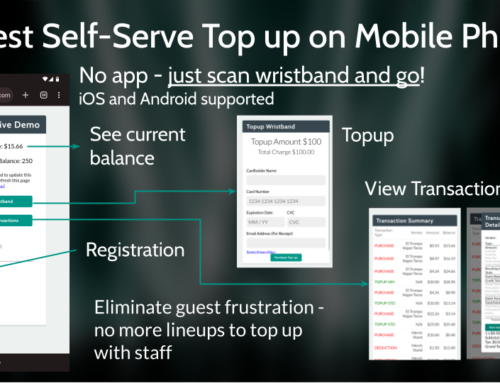As the popularity of festivals continues to rise, so does the demand for convenient and secure payment options. Many festivals have transitioned to closed-loop cashless payment systems to improve the overall experience for attendees. However, there are two types of cashless payment systems: open-loop and closed-loop. In this article, we will explore the differences between open-loop and closed-loop payments and why closed-loop cashless can be the ideal choice for festivals that don’t want to worry about internet connection delays when guests are buying food, beverages, merchandise, or anything else.
Open-Loop vs. Closed-Loop Payments
Open-loop payments are those that can be used outside of the festival or event. For example, if a festival were to use an open-loop payment system, attendees could use the same payment method they use in their daily lives, such as a credit card or mobile payment app. On the other hand, closed-loop payments can only be used within the festival or event. This type of payment system requires attendees to use a festival-specific payment method, such as a wristband, that can be loaded with funds and used to make purchases within the festival.
Why Closed-Loop Cashless can be an Ideal Choice for Festivals
1. Faster Transactions
Closed-loop payment systems are designed to be faster and more efficient than traditional payment methods. When using an open-loop terminal, a request must first be processed by the terminal, then sent to the acquiring bank, the credit card network, and finally the customer’s bank to approve the transaction. Closed-loop transactions are much faster. Our transactions at WristCoin are underwritten offline and always approved in 1 second or less.
The overall event flow is also streamlined by a closed-loop system. Because attendees can simply tap their wristbands to pay for purchases, transactions are completed quickly and without the need for cash or credit cards. This reduces wait times and allows attendees to spend more time enjoying the festival.
2. Reduce Credit Card Processing Fees
Closed-loop cashless systems reduce the cost of processing fees compared to open-loop systems. Because the wristbands are topped up as a single transaction, this greatly reduces the total credit card fees due.
With WristCoin, an organizer can also configure custom fees to help recoup credit card processing charges by adding them to the user’s transaction. This optional feature is a great way for organizers, especially those in the nonprofit sector, to minimize their expenses during an event.
3. Increased Revenue
Closed-loop payment systems can increase revenue for festivals in several ways. First, they eliminate the need for cash transactions, which can be more time-consuming and prone to error. Second, because attendees must use a festival-specific payment method, festivals can earn additional revenue through the sale of these payment methods. Finally, closed-loop payment systems can provide valuable data on attendee spending habits, which can be used to improve the overall festival experience and generate additional revenue opportunities.
4. Enhanced Attendee Experience
Closed-loop payment systems can enhance the overall attendee experience by reducing wait times, improving security, and providing a convenient payment method that is specific to the festival or event. This can lead to increased attendee satisfaction and loyalty, which can help to drive repeat business and increase revenue in the long term.
Overall, closed-loop cashless payment systems are the ideal choice for festivals and events. They offer improved security, faster transactions, increased revenue, and an enhanced attendee experience. By implementing a closed-loop payment system, festivals can provide a more convenient and secure payment experience that will help to improve the overall festival experience for attendees. Get started with WristCoin, the ideal choice for closed-loop cashless events. Explore the benefits of WristCoin here.

